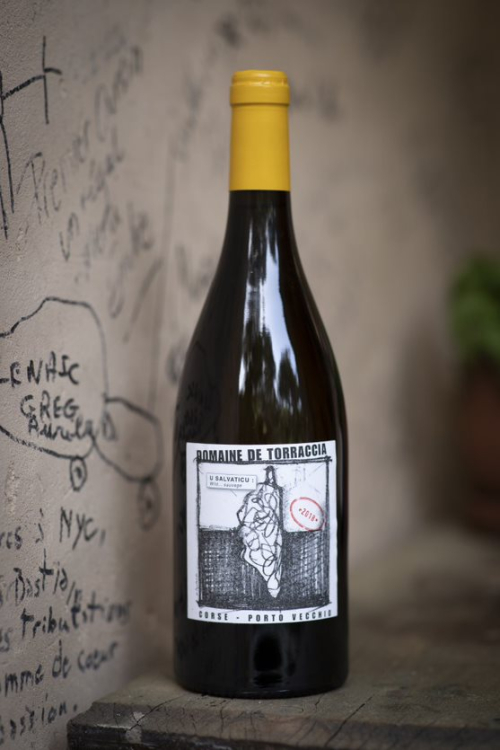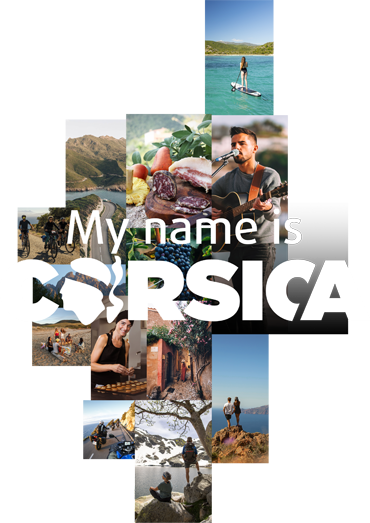Rechercher...
Explore Corsica
Domain of Torraccia
The Philosopher's terroir Quest +
 ©CorseMatin
©CorseMatin
We branch off at the fork under the sign indicating the direction of the domain. Winding the gray-pink road as we enter the land, we follow the forests and cross hamlets, the dense and fragranced maquis offers itself. At the bend of a path, we discover the imposing stone cellar behind the holm oaks. We enter the building, the white and red enamelled concrete vats from the sixties rub shoulders with modern equipment and the linear space dedicated to sales. Mosaic wall plaques serve as markers and timelines. We are warmly welcomed by Marc Imbert with his clear and luminous blue eyes. Time stands still and we travel with it.
 ©CORSE MATIN
©CORSE MATIN
CHRISTIAN IMBERT, AN INSTITUTION
After fifteen years spent in Chad, Christian Imbert landed in Corsica and fell in love with the Domaine de Torraccia. He bought it in 1964 and planted his first vines in 1966. He chose to cultivate the Niellucciu, Sciaccarellu and Vermentinu grape varieties, contrary to the fashionable varieties at the time.
According to him, " Corsican wine will only be saved on two conditions : to preserve its typicality and to reach a high level of quality. In this period, it is difficult to enter the Corsican wine market because the low yields are in competition with the large volumes at low prices from the Eastern Coast. After having fought for the AOC recognition of Corsican wines, Christian Imbert, escorted by a group of visionary winegrowers and committed to the qualitative and identity recognition of the islands wines, founded in 1976 " Uva Corse " a controlled appellation of Corsica. This association of enthusiasts is inspired by respect for the land and the return to Corsican grape varieties. The Domaine de Torraccia has 110 hectares and includes 41 hectares of vines and 25 hectares of olive trees. The vines are trellised and renewed by provignage (layering).
The management of the vines is done while respecting the life of the soil and the biotope: the vines are treated without weedkillers, insecticides, or chemical fertilizers. Christian uses green manure, burying lupine and the following year, vetch, and rye.
It contributes to the deep rooting of the vine stocks by working with the plow, the digging machine and the hook. The only prophylactic treatments are Bordeaux mixture and sulfur flower all done with a manual harvest.
MARC, A SHARP-MINDED SON
Christian Imbert's son, Marc, was born in April 1964. He grew up on his father's estate where he noticed that the diversity of the maquis expressed itself in the vines. Subsequently, he wonders about the involvement of the winemaker in revealing the taste of the terroir.
After some training in oenology, he spent ten years in the United States to acquire a "philosophical background" during which he refined and completed his knowledge of wine-growing techniques. There, he investigated the problem of water stress and realized that long pruning’s were more resistant to water shortages. "If you don't have the ability to puncture, you don't have the ability to feed either. The real phenomenon of water stress is a lack of nutrients which subsequently leads to a delay in photosynthesis. Often, when it comes to water stress, we tend to think that the more plant matter there is to feed, the more water the plant needs! However, studies have clearly confirmed that it is not the quantity of water that is important but the fragmented habituation of the plant to water.
To fight against water stress, it is necessary to condition it at a low rate of irrigation to strengthen its natural resistance," explains Marc Imbert.
His research leads him to analyse the hydrogen protons of granite soils to understand the phenomena of acidification. He also discovers that the diurnal cycle of microbiology is interesting to adapt to cultures. "Understanding the terroir means laying bare all the acquired parameters. It means persisting in understanding the DNA of the terroir to better perceive the place and access the intimacy of nature", according to him.
Marc is a wise scholar whose life is entirely devoted to the quest to transpose the terroir into his wines. He observes the ecosystem, he understands the living, he interprets the land, and he gives birth to wines that capture the soul.
PERPETUAL SEARCH
Three years ago, Marc told Michel Guagnini, his oenologist, that he had lost all inspiration and was looking for a new philosophy. He notices that from one year to the next, he never does the same thing and that he is " always in a perpetual search ".
He then directs his experiments. He tries experiments on green manure, on the invasion of weeds and the delay of ploughing. He wonders about Mediterranean desertification, seasonal cycles, water scarcity and intense droughts. He notes an effect of deactivation of microbial synergy on the plant. He has succeeded in modifying the cycle for five years, but not to fast! According to him, it is essential to let the large masses of vegetation develop and invade as much land as possible. The "bushes" phenomenon will allow the soil to resist drought and prevent erosion.
A PAMPERED VINEYARD
The 42-hectare vineyard, planted in granite arenas, has a high average age. It is planted in red on 34 hectares of Grenache Noir, Niellucciu, Sciaccarellu and 8 hectares of white Vermentinu. Marc pays close attention to improving his plot management. It enriches soil life sporadically as needed. This year, no mulch, no vetch seeds, field beans or radishes. He works his compost and considers a fertilization with horse dung, he uses powdered silica, decoctions of mimosa and treats the vine with homeopathic doses.
Concerned about the health of his vines, he brought back soil from the maquis to complete the plots on the ridges and change the ecosystem. He is trying Cinsault-Vermentinu and Niellucciu-Grenache co-fermentations and is even considering a short-term replanting program of 5,000 Vermentinu vines. The wines are exclusively from organic farming.
The vinification is done in the cellar by gravity on three floors and he remains faithful to the concrete and stainless-steel vats of his father, in which he refines the blends and invents new cuvées. Marc is constantly looking for the precision of the acids in his wines. He explores the expression of wood and tries "brooding" wines. Recently, he ventured into an experimental work of fermentation and aging in " Selvatico " barrels. Annual production, all ranges combined, is around 200,000 bottles. In the future, he plans to focus on quality and reduce his vine surfaces. He wants a transition of pleasure to remain in his vineyards.
 ©domainedetorraccia
©domainedetorraccia
OBSERVE AND RESPECT THE NATURAL ENVIRONMENT
The vine grows in the maquis, benefits from a wonderful ecosystem with a concentrated environmental symbiosis. The pruning and mowing work is very thoughtful and reasoned. Marc respects his environment. If biodiversity is weakened, he lets it regenerate without rushing it. Sensitive to nature, he observed a phenomenon of transition in the cohabitation of insect populations and their reproductive cycle. In 2008, when he took over the estate, Marc only had one ladybird for every fifteen vines. Today, ladybugs are foraging one foot in five as in 1994. For six years, Marc has not strayed too far from his estate and is in harmony with his land.
PHILOSOPHER AND ARTIST
" Philosophy is enormously important, much more than technique! I had the chance to meet people who thought about their art, and I developed a whole questioning about how to "work and think about one's art!" », Explains Marc wishing to infuse wines whose sensory truth is perceptible but ineffable.
One day, having met a renowned photographer, he asked him the question " How do you know you’re about to take a good photo? The answer marked him, "One of the things I look for is that when I press the shutter button, it’s that very unique and specific moment, a moment that I never photographed before. That’s when I know it’s good!”
For Marc, " wine is the same! You must create and build up a surprise! That will confuse the taster.
WHEN ART GENERATES WINE
Thinking about your art means immersing yourself in the seasonal dynamics that influence the metabolism of plants. It is to taste the grape, to grasp the forces of evolution and to perfect one's intimate knowledge. To work on one’s art is to channel, master and extract the aromatic and pedological expressions of each parcel and to complete the work. It is to conceive and raise the quintessence of the wine to the substantial identity of its terroir.
Here, the grey granite brings the mineral bitterness, the pink granite the salinity, the blue diorite diffuses the minerality. The artist Marc has his own panel of senses, he rarely tastes other wines so as not to " confuse his inner wine library ", because when he states the blends, he intuitively defines their profile.
 ©domainedetorraccia
©domainedetorraccia
LET'S PLAY THE RANGES...
The three ranges "Domaine De Torraccia", "Alligria" and "Oriu" come in three colours, white, rosé and red. Vinification and aging take place in stainless steel vats, concrete vats or barrels. The evolution profiles and refines the personality of the wine and the containers bring roundness, volume, and aromatic complexity. The fresh wines are energetic, crisp, full and the reds offer well-adjusted tannins. The last cuvée " Salvaticu ", is a Vermentinu fermented and aged in rich and opulent barrels.
 ©CORSE MATIN
©CORSE MATIN
… AND LET'S TASTE!
"Domaine De Torraccia" white 2021: stainless steel tank, aromatic relief, notes of white flowers, liveliness, citrus, pretty salinity, the length develops fine bitterness.
" Oriu " white 2021: 100% stainless steel tank, notes of citrus fruits and herbs from the maquis, volume and tension, juicy and salivating, beautiful balanced finish.
" Alligria " white 2021: vinified and aged in barrels. " Rich, gourmet, fresh and beautifully woody vanilla, vegetal and citrus notes, slight mineral expression on the gray granite. Keep 5 years.
" Salvaticu " white 2017: marine, iodized, citrus notes, volume and lactic complexity, a modern approach to wine. To decant.
 ©CORSE MATIN
©CORSE MATIN
THE VISITS
On foot, with a glass of wine in hand, come and discover the incredible ecosystem of the Domaine de Torracia. Between sea and mountains, enjoy a bike ride in the vineyards, a family outing in the heart of Corsican nature or an unusual ride in a horse-drawn carriage. The Estate also organizes events in the vineyards: the "Opus Corsica" classical music shows. Four shows are scheduled for the beginning and end of July 2022. The haystacks serve as seats. Every Tuesday, from the beginning of July until August 13, the Domaine de Torraccia brings together around 400 people and presents Corsican music bands.
Domaine de Torraccia
20137 Lecci
Tél. : 04 95 71 43 50
 ©CORSE MATIN
©CORSE MATIN
Locate
powered by cd-media.fr



